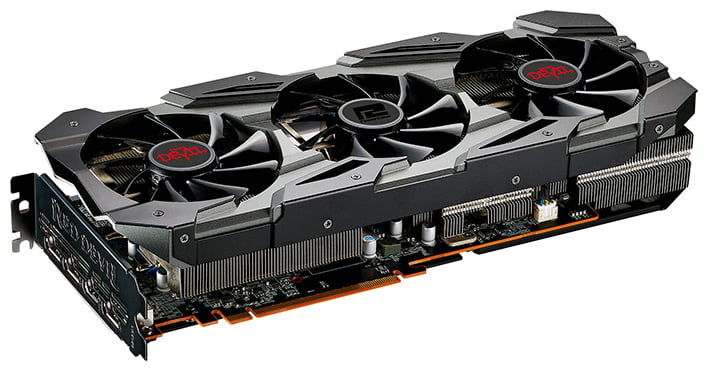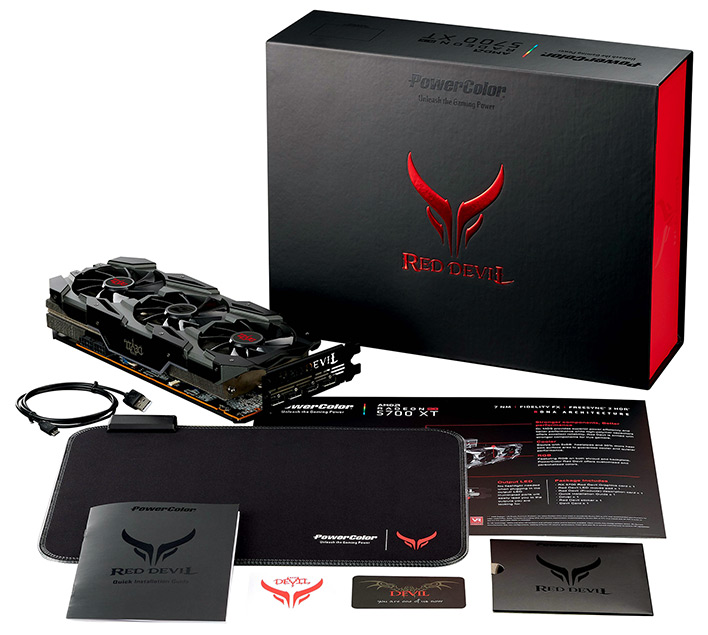PowerColor Radeon RX 5700 XT Red Devil Review: Custom Navi Arrives
The general consensus was that the Radeon RX 5700 series propelled AMD back into a competitive position at the upper-end of the enthusiast GPU market, but that third-party, custom cards would likely address the shortcomings of AMD’s reference design and make the Navi proposition all that much sweeter. Well, we’ve gotten our hands on one of the more sought after third-party Radeons of the last few generations – one of PowerColor’s Red Devil cards – and think that many of you are going to be pleased with what this custom Radeon RX 5700 XT can do. Take a look...
|
| GPU | AMD Radeon RX 5700 XT |
| Architecture | Navi (RDNA) |
| Memory | 8GB GDDR6 |
| Stream Processors | 2,560 |
| Base Clock | 1,770MHz |
| Game Clock | 1,905MHz |
| Boost Clock | 2,010MHz |
| Memory Date Rate | 14.0Gbps |
| Memory Interface | 256-bit |
| System Interface | PCI Express 4.0 |
| Display Connectors | DisplayPort x 3, HDMI x 1 |
| Form Factor | 2.5 slots, ATX |
| Power Connectors | 8-Pin PCIe x 2 |
| Minimum PSU | 700 Watts |
| Price | $449 (Limited Edition), $439 (Standard) - Find Them At Amazon |
Before we dig into the specifics here, we want to point you to a couple of previous articles. We are not going to cover the underlying details of AMD’s RDNA GPU architecture or Navi here, since we’ve already done so in the past. If, however, you would like a refresher, we suggest checking out our Navi architecture piece and our initial review of the Radeon RX 5700 and RX 5700 XT. Those two articles will lay all of the foundation necessary to understand what makes a third-party AIB like the PowerColor Radeon RX 5700 XT Red Devil tick.
At first glance, the PowerColor Radeon RX 5700 XT Red Devil’s main features and specifications don’t seem to differ all that much from AMD’s reference design, save for the higher Game and Boost clocks. Whereas AMD’s reference Radeon RX 5700 XT offers a Game clock up to 1755MHz and a Boost clock of 1905MHz, the PowerColor Red Devil peaks at 1905MHz (Game) and 2010MHz (Boost). Those higher GPU clocks result in higher compute performance and fillrate, etc., but the memory configuration and frequency are the same – so in bandwidth constrained situations, performance won’t be all that much different.
The stream processor, texture, ROP, and display output configurations are also the same as AMD’s reference card, but PowerColor did outfit this puppy with dual 8-pin PCIe power connectors to ensure it has plenty of juice at its disposal.
PowerColor also equips the Radeon RX 5700 XT Red Devil with a BIOS switch that toggles between OC and Silent modes. In OC mode the card has a 220W power target and in Silent mode it has a 180W power target. As you’ll see a little later, for the most part, the effective, real-world differences in performance, power, and acoustics are minimal, so leaving the Red Devil in OC mode and having some additional power at the card’s disposal will probably serve everyone well. On the other hand, if you want to minimize power and keep things as quiet as possible, you won’t sacrifice much in terms of performance in Silent mode.
Underneath its oversized cooler, the PowerColor Radeon RX 5700 XT Red Devil also packs quality DrMos high-polymer caps and a 10-phase VRM design, versus the 7-phases on AMD’s reference card. Those high-end caps and additional phases help spread the load and smooth power delivery, which should help with overclocking and ensure the long-term reliability of the card. Obviously, the cooler on this beast is a significant upgrade over the blower on AMD’s reference design as well. The PowerColor Radeon RX 5700 XT Red Devil features 3 x 90mm dual-bearing fans with 5 copper heat pipes snaking through a dense array of heatsink fins. The heatsink also extends out past the PCB to keep air moving all around the card and minimize the possibility of any hot spots where air could get trapped between the fans, heatsink, PCB, or shroud.
The cooler’s design also seems a bit more subdued versus previous Red Devil’s, at least when it’s not lit up. In lieu of the flashy red accents of previous cards, the PowerColor Radeon RX 5700 XT Red Devil’s shroud now features RGB lighting configurable via the new "DevilZone" utility.
The Red Devil logo along the top edge and the devil horns on the back are now illuminated. The ports and Red Devil branding on the case bracket are also illuminated now, but we have a nit-pick here. PowerColor should have inverted the Red Devil lettering, because it will appear upside-down when installed in a typical tower as it is now. This isn’t a big deal, but it is a detail worth pointing out nonetheless.
We should also mention that the particular bundle / version we are showing you here is a limited-edition which included a mouse pad. Once these are sold out (which will probably happen rather quickly), the standard bundle sans-mouse pad (and $10 cheaper) will take its place. Buyers of either version also get an Xbox Game pass for 3 months in addition to access to the Devil Club website, which grants users access to news, competitions, additional downloads and instant support via live chat.
PowerColor seems to tick all the right boxes with this Red Devil. Let’s fire it up and see how it performs...













